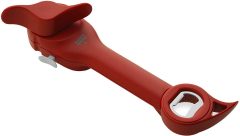
The generous size, soft grip, side knob, and smooth-edge action make this a go-to manual can opener.
The generous size, soft grip, side knob, and smooth-edge action make this a go-to manual can opener.
Smooth-edge opener cuts beneath the rim of the can, doing away with jagged edges. Large, soft-grip handles and side-winding knob emphasize hand comfort. Built-in pliers to lift lid without touching food.
Takes getting used to. Best to hand-wash. A little bulky.

The versatility of this multifunction tool makes it worth a little learning curve.
The versatility of this multifunction tool makes it worth a little learning curve.
Opens standard cans, pull-tab cans, bottle caps, screw tops, and jar lids. Smooth-edge opening to eliminate jagged edges. Auto-attach design does away with clamping. Built-in mini pliers remove lids.
Not dishwasher-safe. Takes a little getting used to.

A solid version of the classic-design can opener with a comfortable knob.
A solid version of the classic-design can opener with a comfortable knob.
Tried and true iconic design. Compact' won't crowd an equipment drawer. Easy-turn knob provides good grip and control. Heat-resistant and safe near hot surfaces. Includes bottle opener.
Leaves jagged edges on lids. Hand-washing recommended.

In our tests, this compact and convenient automatic can opener worked well, if a bit slowly.
In our tests, this compact and convenient automatic can opener worked well, if a bit slowly.
Battery-powered electric can opener opens cans with a button. Ergonomic use for slippery hands. Makes smooth edges for maximum safety. Compact design stores easily in small kitchens and RVs.
This can opener is slower than plug-in models.

The grippy rubber finish of this manual can opener really stood out in our user testing.
The grippy rubber finish of this manual can opener really stood out in our user testing.
Rubber texture was easier to grip than comparable manual can openers in our testing. Made neat cuts. Takes up less space than electric can openers. Easy to clean. Can lid stays locked in place until disposed of.
We wish the knob were easier to turn when cutting through the can.

We recommend these products based on an intensive research process that's designed to cut through the noise and find the top products in this space. Guided by experts, we spend hours looking into the factors that matter, to bring you these selections.

A can opener is one of those kitchen tools that you don’t really think about until you need it. But if you’re caught without one, you realize how essential it is to cooking. Though the manual can opener isn’t high tech or flashy, it plays a vital role in the kitchen.
Many can openers can do more than remove lids. Some include corkscrews, bottle openers, and levers that can make life easier when you’re in a hurry. While the basics are pretty much the same from model to model, there are some can openers that come with a few perks and have superior functionality. And with so many can openers on the market, you might not be sure where to start your search.
You’ve come to the right place. At BestReviews, our goal is to provide you with the information you need to find the best products out there. To get you started, we’ve provided this shopping guide with an in-depth look at what makes a great can opener. Sit back, relax, and know that we’ve done the hard work so you don’t have to.

Handheld can openers are pretty self-explanatory. You place the blade of the can opener on the lip of the can and squeeze both handles with one hand until it punctures the lid. Then you turn the blade crank with the other hand. Comfort and ease of use depend on the quality of the blade and the make of the handles. These can openers can be stored in a drawer or hung for easy access.
Wall-mounted can openers are a permanent addition to your kitchen. These models work well for larger cans. The blade crank is usually longer than on a handheld model, which makes it easier to turn. If you often cook for a crowd, a wall-mounted can opener might be the right choice for you.




















You’ve got two options when it comes to the blade position: top or side. Both positions have pros and cons.
The blade of side-cut can openers makes little to no contact with food, which keeps the blade cleaner.
Top-cut can openers work better if you like to use the can lid to drain liquid out of the can. However, these models need to be cleaned and dried thoroughly to prevent rust and bacteria from forming on the blade.
The design of the handles makes a big difference for those with carpal tunnel syndrome or arthritis. You’ll also want to note the handle size if your hands are smaller than average. Models with nonslip or rubber grips are less slippery than metal models and easier to hold while cutting.
Side-cut can openers are easier to keep clean than top-cut models. However, there are top-cut can openers that can be taken apart and washed in the dishwasher. Regular cleaning helps keep food from building up on the blade, reducing the chances of bacteria contaminating food.
There are a couple of features that make a difference in how easy a can opener is to use. First is how smoothly the blade cuts. Sharp blades set at the correct angle make cutting a breeze. The second feature that enhances performance is the ease with which the can opener attaches to, grips, and punctures the lid. It should be effortless to attach your can opener to the lid. You shouldn’t have to fight the angle of the blade to get a good cut or struggle to get the blade positioned correctly. A good can opener will snap into place automatically and cut without a second trip around the lid.
Some top-cut can openers have lid magnets. A lid magnet saves you from having to pry the lid out of the can, which can be dangerous due to the lid’s sharp edges. The magnet attaches to and holds the lid after you’ve opened the can. You can then remove the lid and throw it away. Some side-cut can openers have lid pliers or tweezers to aid in lid removal, enabling you to remove the lid without having to touch it.
Many manual can openers also include a bottle opener, lid hole puncher, and/or a lever on the head of the can opener. These add-ons add multiple functions to the can opener.

You can expect to pay from about $10 to $50 for a manual can opener.
Inexpensive: For less than $10, you can find an inexpensive stainless-steel can opener. These basic top-cut models may or may not have rubberized grips and don’t usually include any multi-purpose tools.
Mid-range: Between $10 and $25, you’ll find both side-cut and top-cut models made of stainless steel with varying handle and grip styles. These models often include a few extra multi-purpose tools like a lid magnet or lever and offer a good balance of performance and price.
Expensive: From $25 to $50, you’ll find the top-of-the-line manual can openers. These models advertise ergonomic design along with better functionality. However, many of them have the same features as models that cost less. You’ll find some can openers that come as part of a set. The second tool might be a corkscrew or a can opener of a different size.
People with young children might want to look for a can opener that leaves a smooth edge. Children are less likely to get injured, and they might even be able to use the can opener on their own.
You might be tempted by a bargain-priced can opener, but keep in mind that higher-quality materials will enable the tool to cut smoothly and evenly for years.
Some can openers are harder to work than others. If you’ve never used a side-cut model before, there could be a bit of a learning curve before you get used to how it works.

Q. I have arthritis in my hands. Are there manual can openers that will work for me?
A. Can openers with ergonomic handles are designed to be easier to use. Definitely look for models with nonslip or rubber handles to help you get a better grip. You’ll also want to take a good look at the crank handle. It should be easy to use and cut smoothly without a great amount of force on your part. The can opener should keep a firm grip on the can itself. If it doesn’t, you’ll have to apply greater force to hold it in place.
Q. Do lid magnets hold the lid while you cut or do they remove the lid after?
A. It depends on the design. Some magnets are designed to catch the lid as it starts to lift from the can, while others are only meant to remove the lid after it’s been completely separated.
Q. Do I need a special can opener if I’m left-handed?
A. If you plan to run the can opener crank with your left hand, you will need a left-handed model. These can be found, but some cost slightly more. However, if you have the dexterity to hold the can opener with your left hand and run the crank with your right, you should be fine with a right-handed model.
Get emails you’ll love.
Learn about the products you’re wondering if you should buy and get advice on using your latest purchases.
BestReviews wants to be better. Please take our 3-minute survey,
and give us feedback about your visit today.
